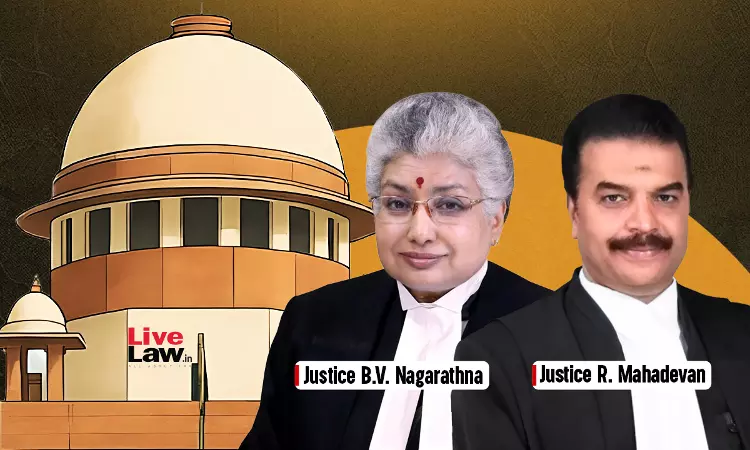- Home
- /
- Supreme court
- /
- Criminal Law Can't Be Used To...
Criminal Law Can't Be Used To Settle Civil Disputes Or Wreak Vengeance : Supreme Court
Yash Mittal
25 Sept 2025 12:41 PM IST
The Supreme Court on Wednesday (Sep.24) quashed a criminal case against an individual against whom an FIR was registered in a pure civil dispute by giving it a criminal color. The Court deprecated the growing use of criminal prosecution as a tool for harassment in purely commercial disputes. “Even if the allegations are assumed to be true, they unmistakably arise out of a commercial...
The Supreme Court on Wednesday (Sep.24) quashed a criminal case against an individual against whom an FIR was registered in a pure civil dispute by giving it a criminal color. The Court deprecated the growing use of criminal prosecution as a tool for harassment in purely commercial disputes.
“Even if the allegations are assumed to be true, they unmistakably arise out of a commercial / contractual transaction relating to loan and repayment, which has been given a criminal colour….the machinery of criminal law cannot be permitted to be misused for settling civil disputes or to wreak vengeance.”, the court reiterated.
The Court noted that the the dispute – concerning repayment of loan money and the alleged coercion in execution of documents – is purely civil in character. The essential ingredients of cheating or forgery were not found to be prima facie made out. The institution of multiple FIRs in quick succession, particularly after the appellant had already initiated lawful proceedings, reinforces the inference of mala fides.
The FIR alleged offences under Sections 420, 467, and 468 IPC, based on claims that Singh advanced a partial loan and coerced the complainant to execute a property sale agreement and issue cheques that later bounced. However, the Supreme Court held that the allegations, even if accepted in entirety, disclosed only a commercial/contractual dispute, not a criminal offence.
Referring to various precedents, the Court summarised the principles relating to quashing of FIRs/Chargesheets under Section 482 CrPC as follows :
“while the jurisdiction under Section 482 Cr.P.C is extraordinary and must be exercised sparingly, it is the duty of the High Court to intervene where continuation of criminal proceedings would amount to an abuse of process of law, or where the dispute is purely of a civil nature and criminal colour has been artificially given to it. Conversely, where disputed questions of fact arise requiring adjudication, the matter must ordinarily proceed to trial.”, the Court added.
Reference was also made to the very recent judgment in Shailesh Kumar Singh @ Shailesh R. Singh v. State of Uttar Pradesh and others which disapproved the practice of using criminal proceedings as a substitute for civil remedies, observing that money recovery cannot be enforced through criminal prosecution where the dispute is essentially civil.
A bench of Justices BV Nagarathna and R Mahadevan heard the case stemming from a property dispute.
The specific FIR accused him of coercing a complainant into a land agreement and issuing dishonored cheques for a ₹1.4 lakh loan. Crucially, the appellant had already filed a case against the same complainant prior to this FIR, and had secured a conviction under the Negotiable Instruments Act for the same dishonored cheques.
The Allahabad High Court had dismissed his petition to quash the charges, citing the need for a full trial to examine his defence. The Supreme Court was hearing his appeal against this dismissal.
Setting aside the Allahabad High Court's decision, the judgment authored by Justice Mahadevan observed:
“The record reveals that within a short span, as many as eight FIRs were registered against the appellant. The gravamen of the allegations in the present FIR is that Respondent No. 2 / complainant approached the appellant for a loan of Rs. 2,00,000/-, but was allegedly advanced only Rs. 1,40,000/-. It is further alleged that, in connection with the said transaction, an agreement to sell dated 09.11.1998 was executed in respect of a plot owned by the complainant, and that the appellant procured three cheques from Respondent No. 2, which, upon presentation, were dishonoured for insufficiency of funds. Even if accepted in entirety, these allegations disclose, at best, a civil dispute and do not prima facie constitute the essential ingredients of the criminal offences alleged.”, the court added.
The impugned FIR was filed as a retaliatory measure as a counterblast to settle scores with the Appellant, the Court said.
“The mala fide nature of the complaint is further fortified by the fact that, by judgment dated 15.01.2025, the trial Court convicted Respondent No. 2 under Section 138 of the N. I. Act, sentencing him to one month's imprisonment and imposing a fine of Rs. 90,000/-. This conviction lends strong support to the appellant's case that the initiation of the present FIR was a retaliatory measure, maliciously instituted with an ulterior motive to neutralise the lawful action taken by him.”, the court observed.
Accordingly, the appeal was allowed.
Cause Title: ANUKUL SINGH VERSUS STATE OF UTTAR PRADESH AND ANR.
Citation : 2025 LiveLaw (SC) 948
Click here to read/download the judgment
Appearance:
For Petitioner(s) :Mr. Anil Kaushik, Sr. Adv. Mr. Rajat Rana, Adv. Mrs. Shashi Sharma, Adv. Mr. Mayank Gautam, Adv. Mr. Saurav Deep, Adv. Ms. Arunima Dwivedi, AOR
For Respondent(s) :Ms. Garima Prashad, Sr. A.A.G. Mr. Sudeep Kumar, AOR Mr. Abhishek Saket, Adv. Ms. Manisha, Adv. Ms. Rupali, Adv.



